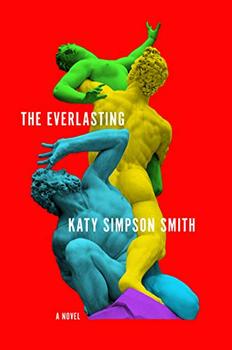Summary | Excerpt | Reviews | Beyond the Book | Readalikes | Genres & Themes | Author Bio

THE CITY
[ 1559 ]
After the trunks from Florence had been put away and the footman had delivered the letter from her lover that she refused to open, Giulia listened at the door for the footstep of her husband—nothing— and then draped veils over the mirrors, took off her heavy skirts, and started in on the Battle for the New World, with the heathens on the verge of surrendering the high mount of Hispaniola. She thrust her umbrella into the rib cage of a writhing Indian; she spun around to lop off the head of a phantom approaching from behind. Blood spattered the silk upholstery. She grabbed the corpses by their ankles and swung them onto the bed to clear the field. A boy ran in front of her, his hands raised in a plea; she kicked open the window and hurled him by his hair into the street below. A man selling eels stared up at her.
On the island, not a soldier stirred. The lady knight Bradamante sheathed her lance and flipped a veil from one of the mirrors. Her eyes were dark and her hair was dark and her skin was darker than was considered pale. Inside her stomach an ant had taken hold. She held her side.
A knock on the door. "My lady, your husband requests your opinion."
"I have no husband," she shouted.
She squinted at her mirror self, who pantomimed. After resituating her breasts so she could look down upon their doughy tops like a shepherdess, and lacing herself loosely into both shirt and sleeves, she spotted her skirts still abandoned on the bed. Holy hell. She could take off her bodice and start over, or—She licked a few curls into place and left her room, yelling "Paola!" so her servant would know she was on the move.
On the staircase, a butler turned to look away.
At the head of the table, shelved between the platters and the porcelain, Bernardetto closed one eye. "My pet," he said, "half of you is missing."
She tossed the skirt of her underwear. "My legs are still invisible."
"And if the cardinal had been here?"
"I imagine all the ladies he's seen are without legs."
She sat down with a long neck and nodded to the servant holding the carving knife, an unknown Roman hired for the occasion and quivering. She waited until her plate had been filled to her satisfaction—all grease and herbs and jellies—and began to eat with a fast succession of tiny bites, as she'd been trained. "Like a rabbit, dear," her aunt had said. "No movement but in the lips."
"How many will be at the church tomorrow?" she asked. On the sideboard behind the table stood a towering cake made of stacked savoiardi and tiny marzipan fruits, and though she was already growing full from chicken, she would not leave the table without demanding a slice from that mountain of sweet. After her mother died, they'd sent her into the hills outside Florence to live with the nuns, who tried to convince her that apples were a great treat—she'd nearly starved herself in defiance until they returned her with a note explaining that her fixation on sugar was preventing her from a proper concentration on Christ.
"You won't be required to speak to any cardinals," her husband said. "They'd just ask when you last attended confession."
"They wouldn't." She snapped her fingers again and pointed at the cake, and the servant rushed toward it with a knife. "They'd ask about the money from the Pescara properties and whether we'd be interested in funding a monastery or two, or maybe a chapel made half of gold in Santa Maria dell'Orto, which is taking forever to be finished because they keep squeezing in more marble." The slice descended before her, and she smiled at it like a putto had flown down from the ceiling. The ant was ravenous.
"Must've been your blaspheming that did poor Ciccio in," he said.
Though her first husband—much older, now dead—had no use for banter, he'd taught her what he knew about the twisted paths of Florentine diplomacy. She'd been married to the new one four days and still wasn't sure what of him was useful. His lips opened and closed, fishlike, when he thought he was being clever.
Excerpted from The Everlasting by Katy Simpson Smith. Copyright © 2020 by Katy Simpson Smith. Excerpted by permission of Harper. All rights reserved. No part of this excerpt may be reproduced or reprinted without permission in writing from the publisher.
Your guide toexceptional books
BookBrowse seeks out and recommends the best in contemporary fiction and nonfiction—books that not only engage and entertain but also deepen our understanding of ourselves and the world around us.